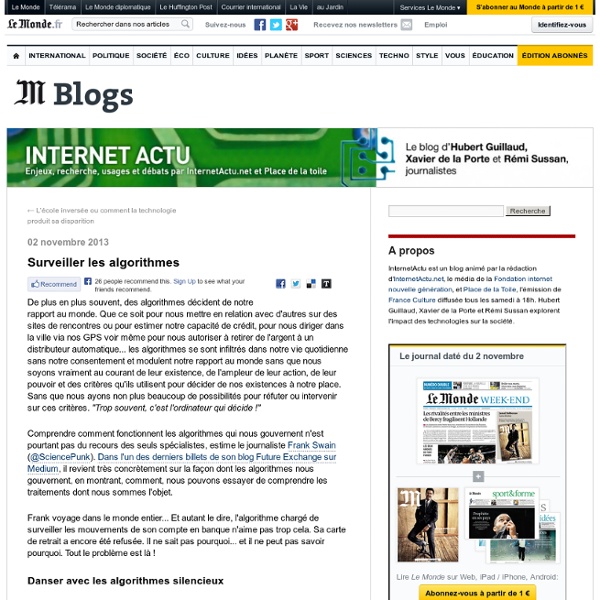Surveiller les algorithmes

The Threat of Artificial Intelligence
If the New York Times’s latest article is to be believed, artificial intelligence is moving so fast it sometimes seems almost “magical.” Self-driving cars have arrived; Siri can listen to your voice and find the nearest movie theatre; and I.B.M. just set the “Jeopardy”-conquering Watson to work on medicine, initially training medical students, perhaps eventually helping in diagnosis. Scarcely a month goes by without the announcement of a new A.I. product or technique. Still, at some level, the only real difference between enthusiasts and skeptics is a time frame. But a century from now, nobody will much care about how long it took, only what happened next. For some people, that future is a wonderful thing. Most people see that sort of fear as silly science-fiction drivel—the stuff of “The Terminator” and “The Matrix.” Of course, one could try to ban super-intelligent computers altogether. Already, advances in A.I. have created risks that we never dreamt of.
scientists put free text-analysis tool on the web
Now anyone can drag and drop text into a linguistic analysis tool powered by machine learning. By Andrew Myers and Tom Abate Ever wondered whether a certain TV show had a slant in favor of a political candidate? Stanford computer scientists have created a website that gives anyone who can cut and paste the ability to answer such questions, systematically and for free. The website is known as etcML, short for Easy Text Classification with Machine Learning. Machine learning is a field of computer science that develops systems that give computers the ability to acquire new understandings in a more human-like way. The etcML website is based on machine-learning techniques that were developed to analyze the meaning embodied in text, then gauge its overall positive or negative sentiment. “All users have to do is copy and paste, or drop their text datasets into their browser and click,” Socher said. Voigt studies what makes a successful pitch. “This is a free and powerful tool,” Socher said.
Le premier robot qui s’adapte aux pannes en deux minutes
LE MONDE | • Mis à jour le | Par Nathaniel Herzberg Les robots sont partout. Sur les planètes éloignées ou au fond des abysses, dans les salles d’opération ou les salles des marchés, derrière les portes closes des usines ou sous le capot de nos voitures. Ils supportent des pressions et des températures qui détruiraient nos corps. Ils calculent, réagissent, mieux que nous. Ils ne tremblent pas, se fatiguent peu. Seulement voilà : ils tombent en panne. Une équipe française a peut-être trouvé la parade. « Je débranche une des pattes » Au sous-sol de l’institut des systèmes intelligents et de robotique de l’université Pierre-et-Marie-Curie, à Paris, Antoine Cully présente sa merveille avec un mélange de timidité et de fierté. Sur le sol du laboratoire, la grosse araignée mécanique avance ses six membres d’un pas saccadé mais régulier. « Maintenant, je débranche une des pattes », sourit-il. Algorithme Rêves d’applications industrielles La technique est classique.
Related:
Related:



